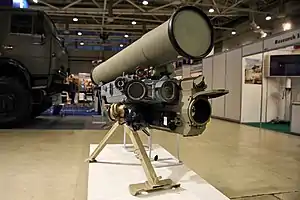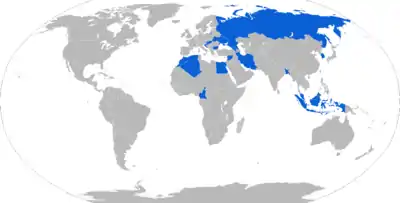| Metis-M / Metis-M1 | |
|---|---|
 Anti-tank missile Metis-M1 | |
| Type | Anti-tank guided missile |
| Place of origin | Russia |
| Service history | |
| In service | 1992–present |
| Used by | See Operators |
| Wars | 2006 Lebanon War Syrian Civil War[1] Iraqi Civil War (2014–2017)[2] |
| Production history | |
| Manufacturer | KBP Instrument Design Bureau |
| Unit cost | $15,500 per missile (2019, export cost)[3] |
| Produced | 1992–present |
| Specifications | |
| Mass | Missile in launch tube: 13.8 kg Launcher: 10.2 kg (Metis-M),[4] 9.5 kg (Metis-M1)[5] Thermal sight: 6.5 kg(Metis-M1)[5] |
| Length | 980 mm |
| Diameter | 130 mm |
| Warhead | HEAT tandem warhead, Armor penetration behind ERA: 800 mm (Metis-M)[6] 900-980 mm (Metis-M1)[5][6][7] thermobaric anti-personnel/anti-material warhead is also available |
| Engine | Solid-fuel rocket |
Operational range | 1500 m (Metis-M)[6] 80 m - 2000 m (Metis-M1)[5][6][7] |
| Maximum speed | 200 m/s |
Guidance system | SACLOS wire-guided missile |
The 9K115-2 Metis-M (NATO reporting name AT-13 Saxhorn-2) is a Russian portable[5] anti-tank guided missile system. "9K115-2" is the GRAU designation of the missile system. The Metis-M1 is the latest upgraded variant of Metis-M.[5] The system is designed to augment the combat power of company-level motorized units.
Overview
.jpg.webp)
The Metis-M / Metis-M1 system adds to the usual positive qualities of a man-portable anti-tank guided missile with significant improvements in range, accuracy and lethality. Owing to the small dimensions and light weight of its components, this manportable system can be carried by its crew in compact packs over any distance and over a wide variety of terrain types, including stream crossing. The three-man crew carries personal weapons and an ammunition load of five missiles. One crew member carries a pack with a missile-loaded launcher, which considerably reduces the time of fire preparation and allows the crew to engage targets whilst moving. In the event of sudden appearance of a target, the operator can fire from the shoulder with the launcher rested against a local object. The two other crew members each carry a pack with two missiles.
Guidance
The Metis-M / Metis-M1 ATGM system has a semi-automatic missile guidance, with commands transmitted over a wire link. The guidance system is constructed so that the most sophisticated and costly components, such as a gyroscopic coordinator, electronic units and an onboard battery, are excluded from the missile.
Features
- changes from the traveling to the firing position—and vice versa—in 15 – 20 seconds;
- firing rate of 3 - 4 rounds per minute;
- fired from organized and deployed sites in the prone and standing foxhole positions, as well as from combat vehicles;
- can be shipped by any type of transport and can be air-dropped.
The Metis-M system comprises:
- combat assets;
- maintenance facilities;
- training aids.
The combat assets of the Metis-M system include:
- 9M131 (9M131F) ATGM;
- 9P151 launcher;
- 1PBN86-VI thermal sight.
Metis-M1
.jpg.webp)
Metis-M1 is the upgraded variant of Metis-M. The new version has greater range of two kilometres (1.2 mi), more armor penetration of 900–980 mm (35–39 in), and reduced weight. It is designed to destroy main battle tanks with Active Protection Systems and Explosive Reactive Armor (ERA), light armored vehicles, fortifications, and other targets in day or night and in any weather condition.[8]
In 2013, Bangladesh Army received large amount of Metis-M1 anti-tank missile systems along with 1200 missiles.[9][10][11] In November 2015, Russia revealed it was formalizing the introduction of the Metis-M1[12][13] and entered service with Russia on March 2, 2016.[14][15]
Operational history
Lebanon
According to accounts by the Israel Defense Forces concerning weapons seized from Hezbollah and from journalists' accounts from Lebanon, the Metis-M was used successfully by Hezbollah fighters during the 2006 Lebanon war against Merkava tanks.[16] Israel has sent a team of officials to Moscow to show the Russians the evidence of what they say can only be Syrian weapons transfers.[17] To date, Russia has not commented on the weapon proliferation, although it has moved to tighten control over the use of Russian-made weapons by the importing states.
South Korea
South Korea purchased a total of 220 Metis-M in two orders—70 in 1995 (Project Brown Bear I) and 150 in 2005 (Project Brown Bear II)—and acquired 9,000 missiles as of 2006. According to the tests, Metis-M was capable of penetrating 850 mm of RHA, providing great firepower for a weapon operated by 2 soldiers. However, between 2009 and 2011, South Korean Army fired 17 missiles for testing, and 10 missiles either missed the target or didn't ignite the warhead upon impact (60% failure). After temporarily removing Metis-M from active service, the Army, the Agency for Defense Development, and the Defense Acquisition Program Administration test fired 43 missiles and achieved 41 hits (7% failure). The joint inspection team hypothesized faulty electronics on the guiding system or failing to maintain in good custody. However, they were not able to identify the cause of the issue, and Metis-M was put back into active service.[18]
Syria
On 7 March 2012, Free Syrian Army fighters used a 9K115-2 Metis-M anti-tank guided missile to hit a derelict Syrian Air Force MiG-23MS.[19] Later during the Syrian Civil War, its use became widespread. Insurgents used it with great success, together with other ATGMs, against different targets, including tanks, infantry fighting vehicles, trucks and firing posts with many videos uploaded on to the internet. Initially, Metis missiles originated from looted Syrian army depots, while later external suppliers could have been involved.
It was confirmed that Bulgaria has sold 6 sets of 9K115-2 Metis via the United States to Syrian rebels.[20]
Operators

Current operators
 Algeria[21]: 315
Algeria[21]: 315  Azerbaijan
Azerbaijan Armenia
Armenia Bangladesh: Metis-M1 systems along with 1200 missiles supplied to Bangladesh Army in 2013.[11][9][10][22]
Bangladesh: Metis-M1 systems along with 1200 missiles supplied to Bangladesh Army in 2013.[11][9][10][22]
_(cropped).jpg.webp)
Non-State Actors
 Donetsk People's Republic[31]
Donetsk People's Republic[31].svg.png.webp) Free Syrian Army[20]
Free Syrian Army[20] Houthis[32][33][34][35]
Houthis[32][33][34][35] Islamic State[1]
Islamic State[1]- People's Defense Units (YPG)[36]
 Tahrir al-Sham: Metis-M systems used.[21]: 357
Tahrir al-Sham: Metis-M systems used.[21]: 357
Former Operators
- FUNCINPEC: during the 1997 Cambodian coup.[37]
See also
Notes
- 1 2 "Bataille de Palmyre: les djihadistes de Daech infligent un revers cinglant à l'armée de Bachar al-Assad". France-Soir (in French). 13 December 2016. Archived from the original on 4 September 2018. Retrieved 4 September 2018.
- 1 2 "Etat islamique: comment les djihadistes emploient les missiles antichars pour appuyer leurs offensives". France-Soir (in French). 4 May 2017. Archived from the original on 6 September 2018. Retrieved 6 September 2018.
- ↑ "Daily use of Russia's anti-tank missiles costs regime $1.2 mn daily". en.zamanalwsl.net.
- ↑ "AT-7 Metis Saxhorn AT-13 Metis-M". fas.org. Federation of American Scientists (FAS). Archived from the original on 2016-08-28. Retrieved 2018-12-15.
- 1 2 3 4 5 6 "Metis-M1". Rosoboronexport. Retrieved 17 July 2021.
- 1 2 3 4 Metis Archived 2016-12-23 at the Wayback Machine - Military-Today.com
- 1 2 "anti-tank system METIS M-1 (противотанковый комплекс Метис - М1)". YouTube. Archived from the original on 10 November 2014. Retrieved 13 November 2014.
- ↑ Russian Armed Forces could receive new Metis-M1 anti-tank guided missile system Archived 2015-11-27 at the Wayback Machine - Armyrecognition.com, 24 November 2015
- 1 2 "Army gets new SP guns, Metis M-1 missiles". Natun Barta. 2013-12-22. Archived from the original on 2013-12-25. Retrieved 2021-07-16.
- 1 2 "Trade-Register-1971-2018.rft". Stockholm International Peace Research Institute. Retrieved 2019-04-21.
- 1 2 "Army gets new SP guns, Metis M-1 missiles". Dhaka Tribune. 2013-12-22. Archived from the original on 22 Apr 2019. Retrieved 17 July 2021.
- ↑ Administrator. "Russian armed forces to receive Kornet-M and 9K115 Metis-M1 anti-tank-guided missiles TASS 12605161 - weapons defence industry military technology UK - analysis focus army defence military industry army". www.armyrecognition.com. Archived from the original on 2017-10-11. Retrieved 2017-06-10.
- ↑ Administrator. "Metis-M1 9K115-2 anti-tank guided missile ATGM technical data sheet specifications pictures video 10912156". www.armyrecognition.com. Archived from the original on 2017-12-07. Retrieved 2017-12-07.
- ↑ "ОАО "Конструкторское бюро приборостроения" - Метис-М1 на вооружении". www.kbptula.ru. Archived from the original on 2016-08-12. Retrieved 2016-06-19.
- ↑ TulaKirill (21 August 2010). "anti-tank system METIS M-1 (противотанковый комплекс Метис - М1)". Archived from the original on 19 June 2016. Retrieved 20 November 2016 – via YouTube.
- ↑ "Defense Update - Assessing the Assessing Hezbollah anti-armour tactics and weapons - by David Eshel". Archived from the original on 13 November 2014. Retrieved 13 November 2014.
- 1 2 "Tough lessons for Israeli armour - BBC". 15 August 2006. Archived from the original on 7 January 2009. Retrieved 13 November 2014.
- ↑ 세계일보 (2012-07-17). "[한국의 무기이야기] 메티스-M, 850mm 압연강판도 뚫어 '강력'". 세계일보 (in Korean). Retrieved 2022-08-21.
- ↑ Oryx. "Oryx Blog". Archived from the original on 13 November 2014. Retrieved 13 November 2014.
- 1 2 Binnie, Jeremy (23 September 2015). "Analysis: UN document shows US bought 610 Fagot missiles". Archived from the original on 1 December 2015.
- 1 2 3 International Institute for Strategic Studies (15 February 2023). The Military Balance 2023 (1st ed.). Routledge. ISBN 978-1032508955.
- ↑ "রাশিয়া থেকে ৮ হাজার কোটি টাকার সমরাস্ত্র কিনছে সরকার - প্রথম আলো". Archived from the original on 2013-01-15. Retrieved 2013-01-09.
- ↑ "Russia's defense talks with Egypt part of regional arms drive". UPI. Archived from the original on 13 November 2014. Retrieved 13 November 2014.
- ↑ Ariel Ben Solomon (9 February 2014). "Report: Russia and Egypt complete $2 billion arms deal". The Jerusalem Post. Archived from the original on 18 January 2023. Retrieved 16 June 2023.
- ↑ "Armament of the Georgian Army". Georgian Army. Archived from the original on 2012-03-09. Retrieved 2007-06-25.
- ↑ "SIPRI arms transfer database". Stockholm International Peace Research Institute. Archived from the original on 14 April 2010. Retrieved 26 May 2016.
- ↑ "M'sia buys Russian missiles, offered new US fighter jets". 13 October 2001.
- ↑ [defense-update.com/products/m/metis_m_31122010.html]
- ↑ "Trade Registers". Stockholm International Peace Research Institute. Retrieved 21 May 2023.
- ↑ Small Arms Survey (2015). "Trade Update: After the 'Arab Spring'" (PDF). Small Arms Survey 2015: weapons and the world (PDF). Cambridge University Press. p. 107. Archived from the original (PDF) on 2018-01-28. Retrieved 2018-08-29.
- ↑ Rigual, Christelle (15 December 2014). Armed Groups and Guided Light Weapons: 2014 Update with MENA Focus (Research Note 47). Small Arms Survey. p. 3. Retrieved 13 June 2023.
- ↑ "The Saudi-UAE War Effort in Yemen (Part 1): Operation Golden Arrow in Aden". www.washingtoninstitute.org. Archived from the original on 2017-02-01. Retrieved 2017-03-17.
- ↑ "YouTube". www.youtube.com. Archived from the original on 2016-05-10. Retrieved 2017-03-12.
- ↑ News Of Yemen (21 November 2015). "Taiz:Watch Saudi & UAE armoured vehicles are sitting ducks for Houthi/Yemeni army anti-tank missiles" – via YouTube.
- ↑ "YouTube". www.youtube.com. Archived from the original on 2017-03-30. Retrieved 2017-03-12.
- ↑ Mitzer, Stijn; Oliemans, Joost (29 October 2021). "Kurdish Armour: Inventorising YPG Equipment In Northern Syria". Oryx Blog.
- ↑ @ShepherdClavis (May 24, 2019). "Another one of the FUNCINPEC's forgotten weapons are their 9K115 Metis ATGMs that were received from an unknown source" (Tweet) – via Twitter.
References
- Russia's Arms Catalog 2004
External links
| External videos | |
|---|---|